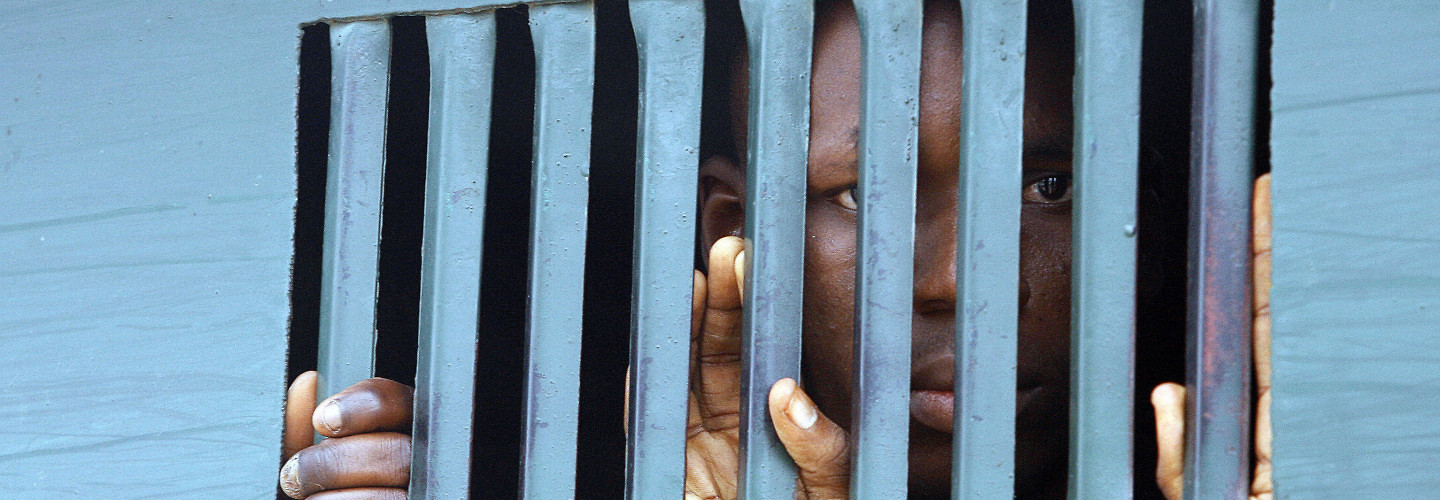Prisoners looks through a slatted window in a police van, Nigeria, August, 2007. (Pius UTomi Ekpei /AFP photo/Getty Images)
When Boko Haram’s current campaign of guerrilla violence began in fall 2010, one of the group’s first steps was to conduct prison breaks in the northeast to free sect members and recruit escapees. In recent weeks, three major prison breaks have occurred in central and southern Nigeria. These attacks raise alarming questions: Is Boko Haram, which operates primarily in the far northeast of Nigeria, attempting a more systematic expansion southward, with these prison breaks as a first step? Or are different forces at work, including thuggery in advance of the February 2015 general elections?
Much remains murky concerning the recent prison breaks. The first occurred in Kogi State on November 2, freeing nearly all of the 145 inmates being held there. According to authorities, armed men blew open prison walls with dynamite. The police stated that Boko Haram was not responsible, and blamed “criminal activity” instead.
The second break took place in Ekiti State on November 30. Accounts describe a large group of men shouting “Allahu Akbar!” using explosives to gain access to the prison and engaging in a firefight with guards. Authorities denied involvement by Boko Haram. The press speculated that the break was intended to free a prominent member of the O’odua People’s Congress, an ethnic militia in the southwest – although that individual reportedly remains in custody.
The third incident happened in Niger State on December 6. According to one astonishing account, an advance team of three “armed robbers” stormed the prison, disarmed guards, and raided the prison armory while “scores of other gunmen took strategic positions round the prison in an operation that lasted for 10 minutes.” This group freed some 270 of the 323 inmates being held. Authorities seem unsure whether Boko Haram was responsible or not.
What evidence might point to Boko Haram’s involvement? First, there is precedent: the sect not only attacked prisons in 2010, it has been associated with other prison breaks: in 2012, it claimed responsibility for an attack at the same Kogi prison that was targeted in November, where some reports say Boko Haram suspects have been held. Second, there is motive: as in the past, Boko Haram may be freeing imprisoned members and recruiting new ones. Third, there is the style of the attacks: the coordinated use of explosives and dozens-strong strike teams bespeaks a high level of organization among the attackers.
If it does turn out that Boko Haram was behind some or all of these attacks, that would represent a worrying trend, a signal that Boko Haram is more systematically undertaking operations in Nigeria’s southwest–and that these prison breaks could constitute preparation for further attacks in these areas.
What evidence, on the other hand, might indicate that other, more conventionally political forces are involved? Above all, there is the high level of tensions surrounding the upcoming general elections. All of Nigeria’s national elections have featured violence and intimidation. Violence will almost surely be part of the equation in 2015, and the recent prison breaks may have occurred in the context of political maneuvering in advance of the elections. International Crisis Group warns, “The country is heading toward a very volatile and vicious electoral contest,” adding that illegal arms are reportedly flooding the country. If all sides are preparing for bloodshed in February, freeing criminals could represent part of the preparations.
As official campaigning began in November, the country was polarized. President Goodluck Jonathan, who is seeking re-election, is a divisive figure, especially in far northern states, where voters rejected him in 2011 and where youth rioted following his victory. Since 2011, prominent members of Jonathan’s party have defected to a new opposition coalition whose strongest base is in the southwest. The rhetoric surrounding the prison breaks has politicized them; in Ekiti, the governor’s staff and the opposition are accusing each other of complicity in the attack there. The theory runs that political parties might be seeking to build cadres of thugs who can disrupt voting, stuff ballot boxes, and attack rivals in February.
Political tensions have run high in all three of the states where prison breaks recently occurred. Ekiti was the site of a contentious off-cycle gubernatorial election in June 2014, where Jonathan’s party scored an upset victory. Niger State is another battleground: its outgoing Governor Babangida Aliyu nearly defected to the opposition last year. In late summer, Niger held an off-cycle senatorial election, which the parties fiercely contested; after irregularities marred the first vote in August, authorities conducted a re-run in September, which the ruling party won. Gubernatorial and senatorial elections are not only proxy fights in a drawn-out contest for the presidency, but also tremendously valuable political prizes in and of themselves – prizes for which some are willing to shed blood.
Moreover, both Niger and Kogi are part of Nigeria’s “Middle Belt.” This ethnically diverse region could be the most consequential electoral battleground in 2015. As Jonathan works to solidify support in the southeast and the far south, and as his challenger Muhammadu Buhari works to stitch together the southwest and the north, the Middle Belt’s votes could determine the winner (Jonathan won those states in 2011). Political strategists may believe that winning the Middle Belt, which already has a history of inter-communal violence, will require muscle.
Whoever is behind the prison breaks, these incidents signal that Nigeria’s authorities are struggling to maintain the rule of law, not just in the far northeast, but also in the Middle Belt and the southwest. Authorities have recaptured some escapees, and police claim to have arrested several “masterminds” of the attack in Niger. But with many prisoners at large, there is reason to fear that violence will continue, both by Boko Haram and by political thugs. These two strands of violence may intersect in ways that render assigning responsibility even murkier—an outcome that would benefit all perpetrators of violence while further undermining the rule of law.





